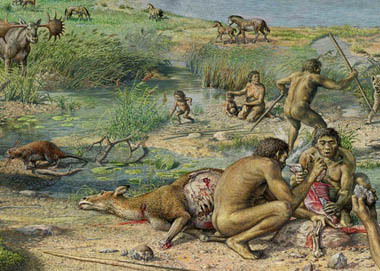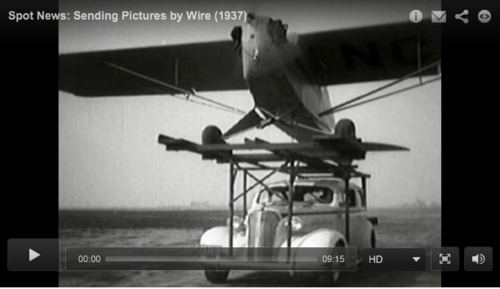 From the days of early gatherings around the fire with fellow tribesmen, one of the most important aspect of tribal life was--sharing news. Whether the news was about sightings of new herds of animals, which would ensure the tribe's survival through the winter, or about the movement of a hostile tribe, sharing news and being informed increased chances for survival.
From the days of early gatherings around the fire with fellow tribesmen, one of the most important aspect of tribal life was--sharing news. Whether the news was about sightings of new herds of animals, which would ensure the tribe's survival through the winter, or about the movement of a hostile tribe, sharing news and being informed increased chances for survival.Of course, we've come a long way from the time of tribal gathering (or we like to think we did), and many things have changed: nowadays the news travels the speed of light, and it can be consumed in many ways. What hasn't changed is that being in possession of a crucial information can still mean survival--political, existential or business survival. What I'm trying to say is--news still matters, probably just as much as before.
Except now in place of a lone messenger, or a group of scouts hunters or warriors, we created the whole media industry. For a while the media people were proud of what they do, followed the code of conduct in which they were supposed to fact-check the information before presenting it to the public, and always kept in mind that the only purpose the media exists is to keep the public informed. Noble idea, right?
So, how did it all got broken? There were several factors, the way I see it. First, the rapid growth of advertising in the media, the money it brought and the influence that comes with it. Where the early newspapers and magazines could survive off subscription and street sales, the lure of money from advertising became too hard to resist. Slowly, printed media switched onto advertising as the main source of income. It was great, they could afford to grow beyond their needs and the golden era of journalism ensued. The reporters travelled the world around many times, stayed in expensive hotels and hired transport to wherever they needed to go. It was good for the news business - the coverage was great from the trustworthy source. The downside was the rise of a star-reporters whose personality threatened to become larger than news they were supposed to report. As their fame grew, they moved to become columnists or hosts of news shows, but that's probably a whole separate topic. Let us go back to the state of the media.
The advance in technology started saturating the advertising market - advertiser spread from print only to the radio, television, and--yes, the Internet, when it came around. At the same time, the ownership of the media outlets changed from journalists who cared about the news to moneymakers who cared about the profit. What we have now is comparable to what had happened with financial sector--the media companies have marketing/sales/advertising teams which are much larger than the editorial teams. What that tells me is that the owners care only HOW to sell, and not WHAT to sell.
With the internet offering advertising targeted narrowly to intended audience, and the public changing from buying their news in print--and the television is slowly feeling the public increasingly reluctant to pay for what it has to offer--to getting it elsewhere, mostly online and for free, print media soon followed by electronic media found itself unable to sustain their large operations.
I know this all was long and yawn-inducing, but it explains what happened next and why we stopped trusting the media to deliver credible news. So--cash strapped media companies increasingly rely on wire agencies to provide the news from the distance. Everybody is covering only their own backyard. The reporters are reporting second-hand from their desks, instead of traveling as before to the scene where the news happened.
The wire agencies on whom we rely to get the news from afar, are also trying to reduce costs. They stopped sending their tried and proven staff reporters on assignments and hire (much cheaper) local freelancers instead. The problem with it is that locals are, by the nature of things, more involved in their local political situation and as such less neutral in their reporting. In plain talk: they tend to take sides and present their preferred side of the story.
To make matters worse, with advance of smart phones and rise of "citizen journalism," everybody is blogging and "reporting" on their own, there's so much not-so-credible information that it's next to impossible to weed out the false from true news. In the newsrooms, the staff is reduced to bare minimum, and the decimated leftover journalists have less and less time to fact-check the reports form the field. Still, the pressure to compete with the web, where speed is everything and 100% accuracy is unimportant, sends the media companies ever more often to report first and fact-check later. We all know the result--growing number of false news is being reported by once-credible news sources, then rebuked. The casualty is our trust in the media.
I know this is very simplified version of a hugely complex problem, but I think I got it right in a nutshell. Here are my thoughts as to what could be done to fix all this.
The main problem is the race for profit. If that's taken out of equation, all that's left to strive for is prestige. And that can be achieved only with high-quality work. Simple, right? The media should go non-profit. It should be financed by independent funds, sheltered from political influence and completely transparent in its finances. How to shelter the funds I haven't quite figure out, except maybe to suggest some international control over it. There would be no advertising, because it wouldn't be needed. Its sole purpose would be to provide credible and accurate information to the public. That way we'd also rid ourselves of the so-called "advertorials"--advertising made to look like editorial news content. And--better yet--there would be no political attack ads.
Imagine if you could tune into a news channel / web site / newspaper and know that all you're getting is a 100% fact-checked news, without bull***? For a journalist it's a dream, maybe unachievable, but worth dreaming.
I'd like to hear what you think about all this. Leave the comments if you like.


No comments:
Post a Comment